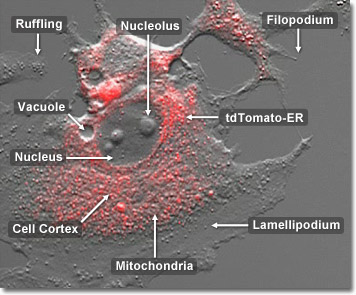The endoplasmic reticulum (ER) is an organelle that is part of all eukaryotic cells and is comprised of an interconnected network of tubules, vesicles and cisternae. These structures are responsible for several specialized functions including protein translation (the folding and transport of proteins to be used in the cell membrane) and the production and storage of glycogen, steroids and other macromolecules. The ER is part of the endomembrane system and its lacey membranes were first seen by biologists in 1945. In the digital video presented above, rabbit kidney epithelial cells (RK 13 line) are expressing a fusion of tandem dimer tomato (tdTomato) fluorescent protein to an endoplasmic reticulum targeting signal.
Video 1 - Run Time: 26 Seconds
Video 2 - Run Time: 39 Seconds
Video 3 - Run Time: 43 Seconds
The endoplasmic reticulum (ER) functions as a packaging system for the cell. While the function of the cell’s nucleus is to act as the “brain” of the cell, the ER works closely with the Golgi apparatus, ribosomes and RNA, to create a network of membranes found throughout the entire cell. Functions of the ER vary greatly depending on its exact type as well as the type of cell in which it resides. In the digital video presented above, rabbit kidney epithelial cells (RK 13 line) are expressing a fusion of tandem dimer tomato (tdTomato) fluorescent protein to an endoplasmic reticulum targeting signal.

There are two types of endoplasmic reticulum (ER): rough and smooth. Both have the same types of membranes but they have different shapes. Rough ER has ribosomes attached giving it a bumpy look and is very important in the synthesis and packaging of proteins. Some of its proteins might be used in the cell and some are sent out. The main purpose of smooth ER is to act as a storage organelle for the cell. It is important in the creation and storage of steroids and also stores ions in solution the cell may need at a later time. Ion storage is important because sometimes a cell needs them fast. It might not want to search the environment for ions, so it is easier to have them stored in a pack for easy use. In the digital video presented above, rabbit kidney epithelial cells (RK 13 line) are expressing a fusion of tandem dimer tomato (tdTomato) fluorescent protein to an endoplasmic reticulum targeting signal.